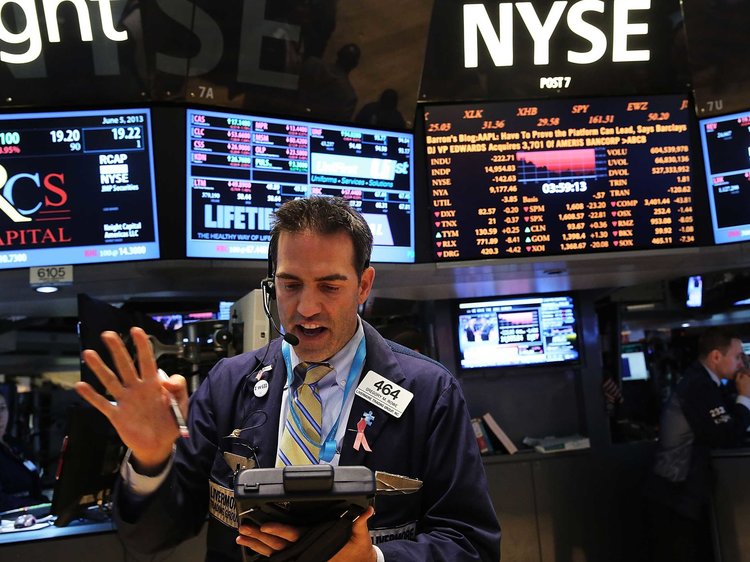
Dow futures rose Wednesday, along with S&P 500 futures and Nasdaq futures. The stock market, closed for Independence Day, is under pressure on Trump trade war concerns. U.S.-China fireworks begin Friday. A pair of sectors at high risk from a Trump trade war have been big losers. That includes Dow Jones industrials such as Boeing (BA) and Caterpillar (CAT), as well as automakers. Chipmakers slumping, with Intel (INTC), Nvidia (NVDA) and Micron Technology (MU) stocks all failed breakouts. Apple (AAPL) stock also coming under pressure, with its heavy exposure to China.
Dow Futures Today
Dow futures rose 0.15% vs. fair value. S&P 500 futures climbed 0.2%. Nasdaq 100 futures were 0.1 % higher.
In Tuesday’s half-day session before the 4th of July holiday, the major stock market averages opened higher but reversed lower. Nasdaq composite fell 0.9%, but closed above its 50-day moving average. The S&P 500 index slid 0.5%, once again sinking below its 50-day line. The Dow Jones industrial average retreated 0.55% after rising intraday above its 200-day line.
Micron stock triggered Tuesday’s sell-off. A Chinese court barred Micron Technology from selling chips in the country, siding with Taiwan chipmaker United Microelectronics (UMC) in a patent fight. Rightly or wrong, investors took that Micron ruling as part of the U.S.-China trade war. China has been holding up approval of the Qualcomm (QCOM)-NXP Semiconductors (NXPI) deal until the U.S. lifts harsh sanctions on China telecom gear giant ZTE.
In any case, Micron stock fell 5.5% Tuesday. The Philadelphia Semiconductor Index retreated 1.8%, moving back below its 200-day line.
Chip stocks have conspicuous laggards in recent months even as the tech-heavy Nasdaq composite hit new highs in June. Even Intel stock, Nvidia stock and Micron stock, which were outperforming the chip sector, have fallen well below buy points and their 50-day moving averages.
U.S.-China trade war tariffs won’t target semiconductors much at first. But the U.S. is wary of China of buying cutting-edge tech as Beijing seeks dominance via Made in China 2025. China could continue to make life difficult for U.S. chipmakers working in China via regulatory hurdles. Longer term, the trend is toward a U.S.-China cold trade war in technology that would roil complex supply chains and cut off markets.
Boeing Stock, Other Global Manufacturers
China is a huge and growing market for Boeing jets. China could favor Airbus (EADSY) over Boeing in a trade war. Boeing was the top Dow Jones stock in 2017. Boeing stock recently triggered a sell signal and is trading below its buy point.
Another Dow Jones component, Caterpillar stock has fallen below its 50-day and 200-day lines.
General Motors (GM) and Ford (F) just reported solid U.S. sales. But GM stock, Ford stock and their global peers are struggling as Trump threatens a global auto import tariff. That would trigger retaliation and raise supply chain costs as even U.S.-made cars and trucks tend to have high non-U.S. content.
Apple Stock
Apple, another Dow Jones stock, is also vulnerable to a prolonged U.S.-China trade war. China is a big market for the Apple iPhone and various services. Most Apple iPhones are made in China. A trade war could hit iPhone suppliers, China could hold up exports and threaten any number of actions to hinder Apple.
Apple stock blasted out of a buy zone in a sharp rally from the end of April to early May. Strong earnings helped, though that was more to do with fast-growing services than the iPhone. A huge stock buyback and Warren Buffett’s Berkshire Hathaway (BRKB) buying more Apple stock also big factors.
But in recent weeks, Apple stock has been fading. It’s now just modestly above a buy point. Shares are fighting for support at 50-day, closing just below that level Tuesday.
Trump Trade War With China Starts Friday
So far stocks have largely retreated on trade war fears, with the hope that the actual damage will be minimal. But on Friday, President Trump is due to impose tariffs on $34 billion of Chinese goods, mostly tech and telecom products. China says it will immediately retaliate, dollar for dollar.
Trump has threatened tariffs on another $200 billion in Chinese goods, and then a further $200 billion.

